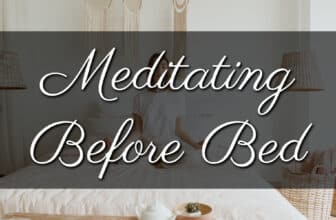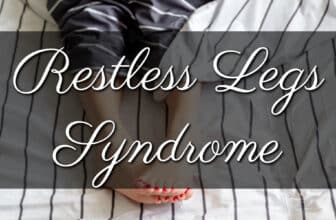Catching a cold can be a real bummer, especially when it disrupts your sleep. But what if we told you that there are ways to sleep better with a cold? Yes, it’s possible!
Your immune system needs quality sleep to help you recover, and we understand how challenging it can be to rest peacefully when congestion, coughing, and a sore throat keep you up at night.
Let’s explore various strategies to ensure a comfortable sleep environment, optimal sleep positions, nighttime remedies, and sleep hygiene practices that can help you learn how to sleep with a cold and recover faster.
So, grab a warm cup of herbal tea, snuggle up, and let’s dive into these sleep-friendly tips for cold relief!
Preparing Your Bedroom for a Restful Sleep

Your bedroom plays a crucial role in helping you fall asleep and stay asleep, especially when you’re dealing with a cold. The key is to create a comfortable and soothing environment that supports your body’s recovery process.
1. Maintain a Cool Room Temperature
Did you know that the ideal temperature range for a good night’s sleep is between 60-67°F (15-19°C)? Maintaining a cool room temperature is particularly important when you’re battling a cold, as it can help soothe a sore throat and alleviate cold symptoms. So, try setting your thermostat a bit cooler than usual to help you fall asleep more easily.
When you’re feeling sick, your body’s temperature regulation might be a little off. To stay comfortable during your sleep, keep extra blankets handy. This way, you can easily adjust your body temperature and ensure a cozy and quality sleep.
2. Use a Humidifier Wisely
Experiencing nasal congestion and dry air during a cold can make breathing difficult and disrupt your sleep. A humidifier can come to your rescue by adding moisture to the air, easing congestion, and supporting your overall respiratory health. Using a cool-mist humidifier can be particularly beneficial in reducing sleep deprivation during a cold.
Here are some tips to follow:
- Ensure the humidity level in your room stays between 40-60% to avoid nasal congestion caused by excess moisture.
- Too much humidity can also lead to mold and mildew, worsening your breathing issues.
- Clean your humidifier regularly to prevent bacteria and mold growth.
3. Block Out Disruptions with White Noise
White noise can be a game-changer when it comes to improving your sleep during a cold. It is a mix of different frequencies at the same volume, designed to block out disruptions and help you drift off to quality sleep more quickly. There are various types of white noise, including fan noise, static noise, and nature sounds, depending on your preferences.
Experiment with different white noise options to find the one that works best for you. The use of white noise not only helps you fall asleep faster but also promotes longer and more restful sleep by muffling background noise and chatter.
We suggest the Hatch Restore 2 Sunrise Alarm Clock and Sound Machine, which is a little on the pricey side, but is a great way to not only generate white noise, but also other sleep sounds, and lets you fall asleep and wake up more naturally by mimicking the sun’s rise and fall.
Optimal Sleep Positions for Cold Relief
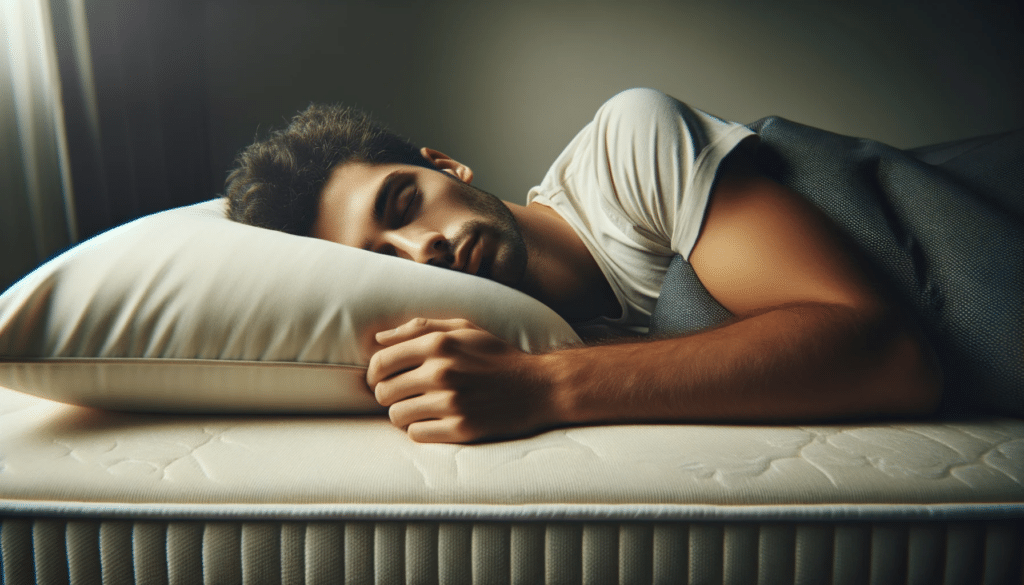
Your sleep position can significantly impact your cold symptoms and sleep quality. Let’s examine two sleep positions beneficial for alleviating cold symptoms and enhancing your sleep experience: side sleeping and back sleeping with a raised head.
4. Side Sleeping
Side sleeping has numerous benefits, especially when dealing with colds and flu. It helps keep your airways open, eases congestion, and prevents snoring, which can be a common issue during a cold.
To sleep on your side, start by lying on your back and rolling onto your side. Place a pillow between your legs to keep your hips aligned, and use a body pillow for extra comfort.
The advantages of side sleeping during a common cold include:
- Improved breathing and reduced congestion
- Enhanced drainage of nasal passages
- Reduced snoring
- Better alignment of the spine
- Reduced risk of acid reflux
Consider giving side sleeping a chance, and observe its impact on your sleep quality during illness.
5. Back Sleeping with Head Elevation
Sleeping on your back with your head slightly elevated can work wonders for your sleep quality during a cold. This position helps:
- Open up your airways, making it easier to breathe
- Reduce mucus accumulation
- Ease sinus pressure
- Minimize swelling that occurs when lying flat
To achieve this sleep position, elevate your bed, pile pillows under your head, or get a specialized wedge pillow to elevate your head, like the Relax Home Life Wedge Pillow.
By sleeping with your head raised, you can prevent post-nasal drip, lessen sleep apnea and snoring, and keep your spine in alignment.
Nighttime Cold Remedies for Better Sleep
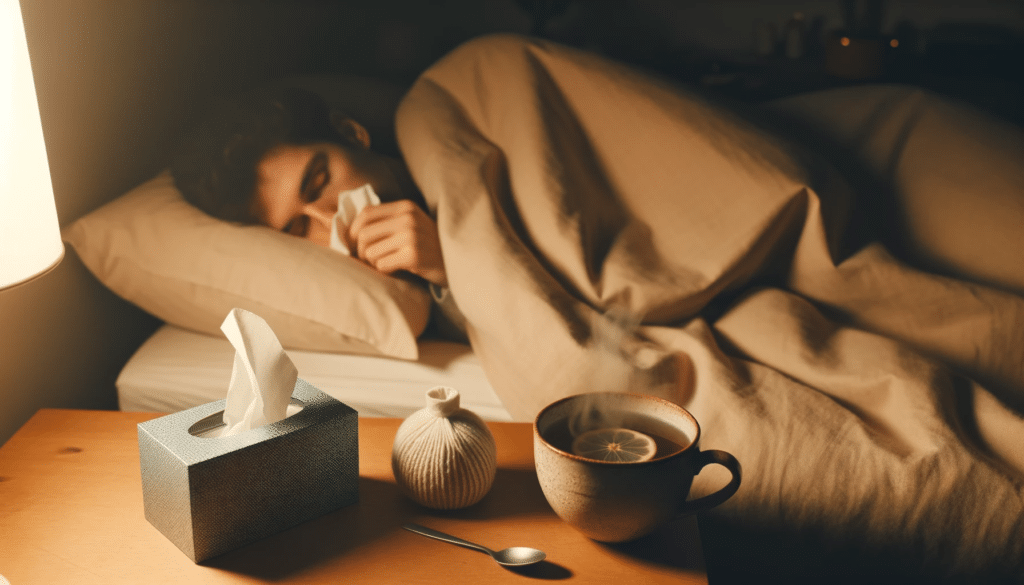
Having a cold can make falling asleep quite challenging, but various nighttime remedies can help promote better sleep. Let’s look at three effective remedies for improved sleep during a common cold: calming beverages before sleep, nasal care, and the advantages of vapor rub.
6. Soothing Drinks Before Bed
One of the simplest ways to relax before bed when you’re not feeling well is to sip on soothing, caffeine-free drinks. Herbal tea, warm water with lemon and honey, and clear broth are excellent choices as they help calm your mind, reduce stress, and promote better sleep.
Avoid consuming alcohol, as it can disrupt your sleep and worsen your cold symptoms. Instead, opt for these comforting drinks and let their warmth and natural ingredients work their magic in soothing your sore throat and nasal passages, setting the stage for a peaceful slumber:
- Warm herbal tea with honey and lemon
- Ginger and turmeric tea
- Warm water with lemon and honey
- Chamomile tea with a dash of cinnamon
- Warm milk with a pinch of turmeric and honey
7. Nasal Care
Clear nasal passages are essential for better sleep during a cold, especially when dealing with a runny nose. One effective way to clear your stuffy nose is by inhaling steam or using a humidifier during sleep. Another option is to use a saline nasal spray before bed, which can help clear your nasal passages and make breathing easier while you sleep.
Nasal strips can also be beneficial in widening your airway and increasing airflow, making it easier for you to breathe and get a good night’s sleep when you have a cold.
8. Vapor Rub Benefits
Vapor rub is a popular cold remedy that can help with:
- coughs
- congestion
- sore muscles
- minor sore throat and bronchial issues
Applying vapor rub before bedtime can trick your brain into feeling better, potentially helping you sleep more soundly.
Sleep Hygiene Practices for Faster Recovery
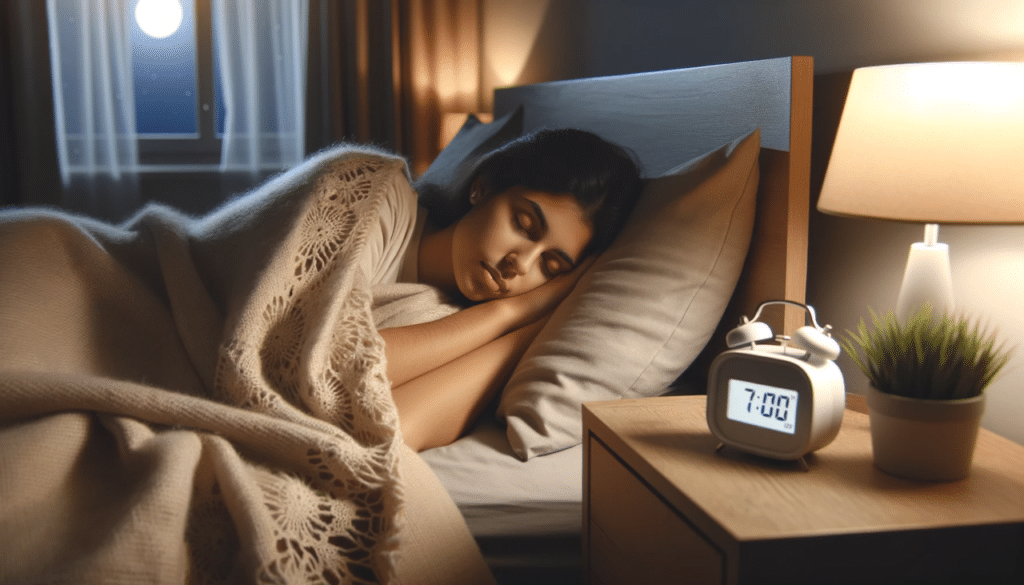
While all the tips we’ve discussed so far are essential for better sleep during a cold, it’s also crucial to maintain good sleep hygiene practices to support a faster recovery. We will delve into three sleep hygiene practices in this part, which can reinforce your immune system and expedite your recovery: adhering to a consistent sleep schedule, curbing daytime naps, and stress and anxiety management.
9. Consistent Sleep Schedule
Maintaining a regular sleep schedule is crucial for improving your overall sleep quality, especially when you’re dealing with a cold. Sticking to the same bedtime and wake-up time every day, even on weekends, helps keep your circadian rhythm in check, which is your body’s natural clock that controls your sleep-wake cycle.
To stay on top of your regular sleep schedule, avoid napping during the day, cut down on caffeine, and stay away from screens before bed. By following a consistent sleep schedule, you can give your immune system the rest it needs to help you recover faster.
10. Limiting Daytime Naps
While daytime naps can be tempting, especially when you’re feeling sick, it’s essential to limit them to no more than 30 minutes. Knowing how much sleep you need at night can help you make better decisions about napping. Cutting down on daytime naps can bring various benefits, such as:
- Less sleepiness
- Better memory and learning
- Increased alertness
- Improved mood
The best time for a nap is mid-afternoon when your energy levels are usually lower. Avoid napping close to bedtime, as it can disrupt your regular sleep pattern. By limiting daytime naps, you can enhance your nighttime sleep routine and support your body’s recovery process.
11. Managing Stress and Anxiety
Managing stress and anxiety is vital for better sleep, especially during a cold. Techniques such as:
- Journaling
- Meditating
- Deep breathing
- Practicing yoga
- Exercising
- Taking a hot shower
- Talking to a therapist
Incorporating these stress-relief methods into your daily routine can bring numerous benefits, including:
- Lower blood pressure
- Better mental health
- Improved sleep
- Stronger immune system
By managing stress and anxiety effectively, you can create a more relaxing sleep environment and accelerate your recovery when you sleep with a common cold.
Medications for Better Sleep with a Cold
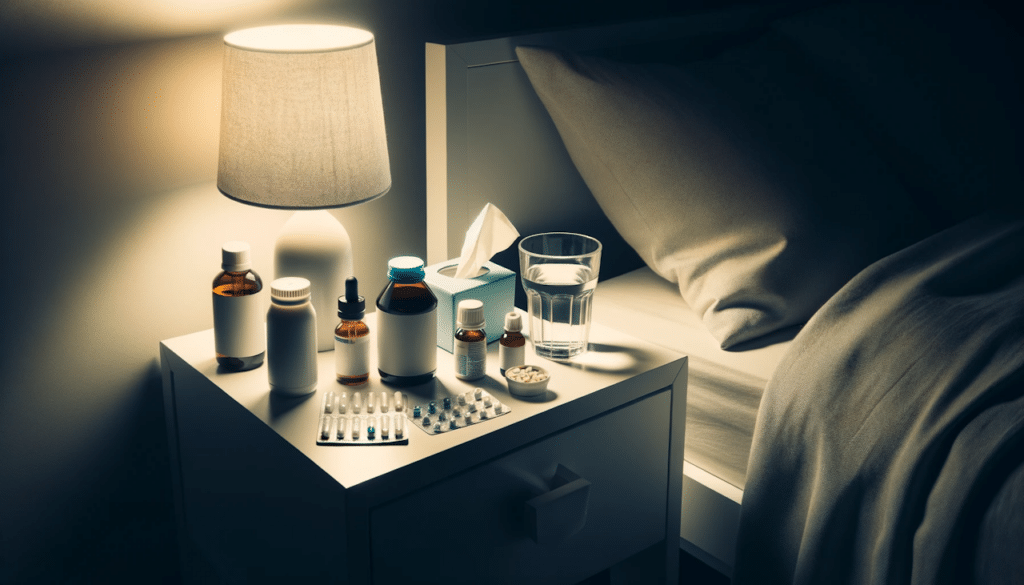
12. Decongestants
Decongestants can help alleviate sinus and nasal congestion, making it easier for you to breathe and sleep with a cold. They work by reducing the swelling in your nasal passages, allowing air to flow more freely so you can clear that blocked nose and breathe easier. Examples of over-the-counter decongestants include pseudoephedrine (Sudafed) and phenylephrine (Neo-Synephrine).
13. Antihistamines
Antihistamines can help with runny noses and sneezing, symptoms that can disrupt your sleep. They work by blocking histamine, a substance your body produces during an allergic reaction. Some antihistamines, like diphenhydramine (Benadryl), can also make you drowsy, which can be helpful if you’re having trouble falling asleep.
14. Cough Suppressants
Cough suppressants, or antitussives, can help control your cough, allowing you to sleep better. Dextromethorphan is a common ingredient in many over-the-counter cough medicines. Cough medicine works by numbing the cough reflex, reducing the urge to cough, which can be particularly disruptive to sleep.
15. Pain Relievers and Fever Reducers
Over-the-counter pain relievers and fever reducers, such as acetaminophen (Tylenol) and ibuprofen (Advil, Motrin), can help with discomfort and fever that might be keeping you awake.
When to Seek Medical Help

Although most cold symptoms subside within a week or two, knowing when to consult a medical professional is crucial. If your cold and flu symptoms persist for more than two weeks or if you suspect a more serious condition, consult a healthcare provider for proper evaluation and treatment.
Getting good quality sleep is crucial for giving your immune system a boost and helping your body bounce back from illness. By following the tips and practices discussed in this blog post, you can improve your sleep quality during a cold and support your body’s natural healing process.
Summary
Sleeping better during a cold is achievable by creating a comfortable sleep environment, adopting optimal sleep positions, using nighttime remedies, and maintaining good sleep hygiene practices. By implementing these strategies, you can not only improve your sleep quality but also support your immune system and speed up your recovery process.
So, the next time you’re battling a cold, remember these helpful sleep tips and give yourself the gift of peaceful sleep. Sweet dreams and speedy recovery!
Frequently Asked Questions
What helps you sleep when you have a cold?
To help you sleep with a cold, try drinking hot tea with lemon juice, keeping your head elevated, using an air humidifier, choosing the right medications, taking a hot shower, gargling with warm salt water, preparing your environment for better sleep, and practicing relaxation techniques.
Why can’t I sleep when I have a cold?
Coughing, sneezing, congestion, a runny nose, a sore throat, and other nsaty cold symptoms can make falling asleep difficult. To help counteract these disruptions, follow the tips above for relief.
Why does a cold feel worse at night?
At night, the body’s immune system works harder to fight infections, resulting in fevers or chills. Additionally, cortisol levels drop off when you sleep, leading to increased inflammation which can worsen cold symptoms. Together, these factors make colds seem much worse at night.
What is the best position to sleep when congested?
To reduce congestion while you sleep, try sleeping on your back with an extra pillow or wedge pillow propping up your head and neck – this will help drainage and decrease stuffiness. Additionally, using nasal strips will help open your nasal passages, allowing you to breathe easier, allowing for good quality sleep.
How can I make my bedroom more comfortable for sleeping during a cold?
To make your bedroom more comfortable for sleeping during a cold, keep the room cool, use a humidifier to add moisture, and block out noise with white noise.



